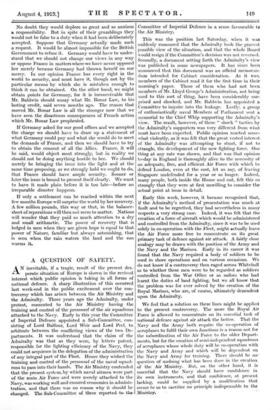A QUESTION OF SAFETY.
N inevitable, if a tragic, result of the present des- perate situation of Europe is shown in the revived interest which public opinion is taking in all forms of national defence. A sharp illustration of this occurred last week-end in the public excitement over the con- troversy which has arisen between the Air Ministry and the Admiralty. Three years ago the Admiralty, under protest, consented to the Air Ministry having the training and control of the personnel of the air squadrons attached to the Navy. Early in this year the Committee of Imperial Defence appointed a Sub-Committee, con- sisting of Lord Balfour, Lord Weir and Lord Peel, to arbitrate between the conflicting views of the two De- partments. It was understood that the claim of the Admiralty was that as they were, by letters patent, responsible for the fighting efficiency of the Navy, they could not acquiesce in the delegation of the administration of any integral part of the Fleet. Hence they wished the training and control of the personnel of the naval squad- rons to pass into their hands. The Air Ministry contended that the present system, by which naval airmen were part of the main Air Force and were merely attached to the Navy, was working well and ensured economies in adminis- tration, and that there was no reason why it should be changed. The Sub-Committee of three reported- to the Committee of Imperial Defence in a sense favourable to the Air Ministry.
This was the position last Saturday, when it was suddenly rumoured that the Admiralty took the gravest possible view of the situation, and that the whole Board would resign if the Committee's decision was not reversed. Secondly, a document setting forth the Admiralty's view was published in some newspapers. It has since been announced that this document was an official memoran- dum intended for Cabinet consideration. As it was, members of the Cabinet read it for the first time in their morning's paper. Those of them who had not been members of Mr. Lloyd George's Administration, not being used to this sort of thing, have been considerably sur- prised and shocked, and Mr. Baldwin has appointed a Committee to inquire into the leakage. Lastly, a group of enthusiastically naval Members of Parliament sent a memorial to the Chief Whip supporting the Admiralty's view. The result, however, of these " shock " tactics by the Admiralty's supporters was very different from what must have been expected. Public opinion reacted some- what violently, as it was felt that the great vested interest of the Admiralty was attempting to stunt, if not to strangle, the development of the new fighting force. One thing at any rate was shown, and that was that opinion to-day in England is thoroughly alive to the necessity of an adequate, free, and efficient Air Force with which to defend London, even at the cost, let us say, of leaving Singapore undefended for a year or so longer. Indeed, many people, both inside the House and out, felt this so strongly that they were at first unwilling to consider the actual point at issue in detail.
Early this week, however, it became recognized that, if the Admiralty's method of presentation was much at fault and to be regretted, they had nevertheless in many respects a very strong case. Indeed, it was felt that the creation of a force of aircraft which would be administered and controlled from the Admiralty, since it was to be used solely in co-operation with the Fleet, might actually leave the Air Force more free to concentrate on its great primary task of defence against air attack. A fairly close analogy may be drawn with the position of the Army and the Navy and the Marines. Early in its career it was found that the Navy required a body of soldiers to be used in shore operations and on various occasions. We do not know if a controversy then raged across Whitehall as to whether these men were to be regarded as soldiers controlled from the War Office or as sailors who had learnt the duties of land fighting, but we all know that the problem was for ever solved by the creation of the Royal Marines, who are, of course, ultimately dependent upon the Admiralty.
We feel that a solution on these lines might be applied to the present controversy. The more the Royal Air Force is allowed to concentrate on its essential task of national defence against air attack the better. That the Navy and the Army both require the co-operation of aeroplanes to fulfil their own functions is a reason not for the subordination of the Air Force to the older Depart- ments, but for the creation of semi-independent squadrons of aeroplanes whose whole duty will be co-operation with the Navy and Army and which will be dependent on the Navy and Army for training. There should be no- question of undoing what has been done in the creation of the Air Ministry. But, on the other hand, it is essential that the Navy should have confidence in its own instruments, and that confidence, at present lacking, could be supplied by a modification that seems to us to sacrifice no principle indispensable to the Ministry: -


































 Previous page
Previous page